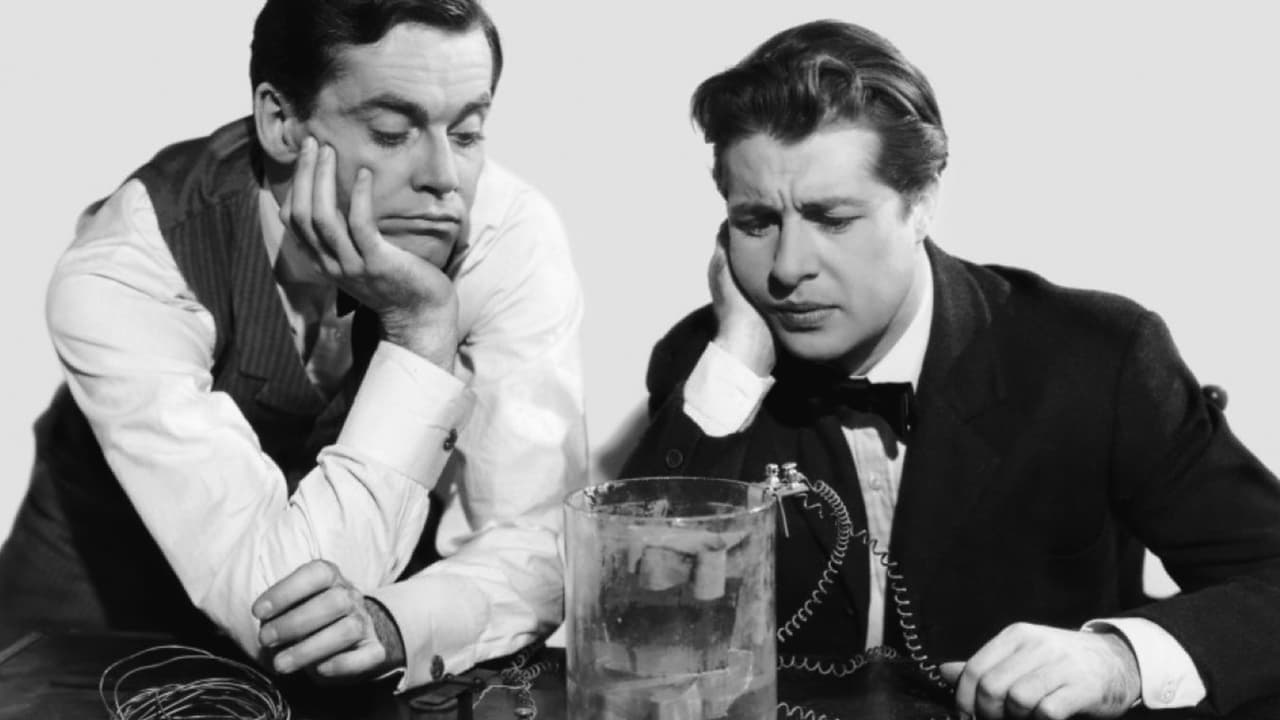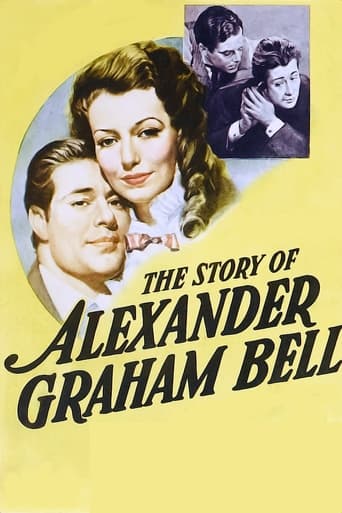

I felt compelled to click the "Contains spoiler" box for a story about Alexander Graham Bell, the "spoiler" being that he invented the telephone. What does that tell us about the end of civilization as we know it? Actually, this is an engaging movie, although I believed only certain features of its presentation. Alexander Graham Bell was born. He invented the telephone. He died. Of those points I'm sure. I guess his wife was deaf and Bell himself, a Scot by birth, was preceded by two generations of writers interested in the mechanics of speech and associated pathologies. And we know he had an assistant named Watson, Henry Fonda here, because of that famous first voice transmission -- "Watson, come here. I need you." I'm doubtful that it was caused by Bell's having spilled sulfuric acid on his leg. It's true, too, that the success of the device was boosted when it was adopted in the palace of Queen Victoria, or so I was taught years ago in an anthropology course on culture change and innovation.But all that doesn't amount to much. The film is an entertaining piece of semi-educational family fare. Bell and Watson suffer through hard times together, punctuated by occasional breakthroughs or epiphanies, usually followed by more hard times. As Watson, Henry Fonda adds some necessary common-sensical and often softly funny observations about the lives they're leading. Too bad he more or less disappears from the movie about half way through, like Lear's fool.But it's Boston in 1875 and we see the obsessive Bell making his way through a light snow fall of cornflakes while children throw snowballs at him, a lamplighter lights a lamp, screaming children ride sleds along the sidewalks embanked by fake snow, and horses and carriage jingle their way down the studio streets. There are Christmas carols and mute children who learn to say "father", and Christmas dinners and presents, and a love interest in the appealing form of Loretta Young.There's something winning about these old-fashioned studio productions. In this case, the studio was 20th-Century Fox and the producer was Daryl Zanuck, renowned for his ability to polish a script into a nicely structured, well-written, and thoroughly commercial form, and for being a Goy from Wahoo, Nebraska. I love the fake snow and the teary children and the determined scientist distracted by love and the need for money. Even if you don't believe a word of it, it's still a comforting experience.Don Ameche approaches his role with the innocent hyperbolic enthusiasm of a child. Fonda seems sleepy and is all legs, like young Mister Lincoln. Loretta Young has calf-like eyes and a sweet smile and is so demure that she manages to suggest barely repressed volcanic passions. The supporting cast are mostly familiar -- Charles Coburn, Gene Lockhart, and Spring Byington -- and they turn in professional performances.The climactic courtroom battle is something of a let down. Poor Bell was the victim of innovational inevitability. The telephone was just one example of an endless list of simultaneous discoveries and inventions. I can only think of the gasoline-powered car, oxygen, radar, and the jet engine at the moment. In a way, culture advances in accordance with its own schedule and the inventors and discoverers acclaimed as genius's are its instruments, people who happened to be in the right place at the right time with the right temperament. If I can dig up that list of simultaneous inventions I'll post it on the message board.Anyway, a routine but likable biography from the old studio system, now thoroughly defunct.
... View MoreDon Ameche has the title role in "The Story of Alexander Graham Bell" in this 1939 film starring Henry Fonda, Loretta Young, Charles Coburn, Gene Lockhart, and Spring Byington.This movie was a big hit - it must have been, because in 1941's "Ball of Fire," Barbara Stanwyck teaches Gary Cooper slang and refers to the telephone as "the Ameche," as others have mentioned here. As far as how accurate the story is - for Fox, not bad at all. The background of Bell's teaching experience and family history of working with speech and sound is correct, he did have a demonstration of his new device, he did have patent problems, he did take on the little boy and Mabel as deaf clients to teach, he did teach finger-spelling, he did have patent problems, he did marry Mabel, their first child was a girl, and Mabel's father was one of his investors. The Fonda character, Watson, was also real, though Bell had two other assistants, and the scene where Bell finds out the telephone works when he calls for Watson is accurate. Also, Bell mentions a great interest in aeronautics in the movie - he indeed did a lot of work in aeronautics later on.Don Ameche does a great job as Bell. Before Tyrone Power appeared at 20th Century Fox, Ameche was set for many more lead roles; Power's popularity pushed him into second leads. If Ameche seems melodramatic in the courtroom scenes, that was the style of the day. He gives a serious, intense, and sincere performance. It's probably the role for which he's best remembered. Henry Fonda is wonderful - he's funny and relaxed, positively excellent. In another year, he'd be starring in his own movies. Loretta Young as Mabel is believable as well as lovely, and her sisters in real life -- Sally Blane, Polly Young, and Georgiana Young - play her sisters here.Gene Lockhart as Sanders is another standout in a poignant performance as a man who wants his deaf son to be able to speak. Charles Coburn plays Mable's no-nonsense, gruff father very well.Considering that the movie "Suez" is fiction from beginning to end, 20th Century Fox is to be commended for bringing so much real history into this film and making it so entertaining.
... View MoreStory of Alexander Graham Bell, The (1939) *** (out of 4) Delightful tale of Alexander Graham Bell (Don Ameche) who while attempting to create the telephone falls in love with a mute girl (Loretta Young). The film really doesn't go into much detail about how the phone was created but instead it focuses on the pain that Bell went through while trying to break through. Ameche is downright brilliant in every shape of the word and his strong performance makes you forget several of the flaws throughout the film. Loretta Young is also very good as his wife and Henry Fonda adds nice support as the assistant. The film has some nice humor to go along with the drama and while I'm sure there are some facts made up, the film is still worth watching if you're a fan of the cast.
... View MoreI always thought of him being an under rated actor. He certainly was versatile. He could sing, play comedy and drama, and if for no other reason, the academy finally realized his talents and gave him an oscar. It was long overdue. As for this film, he was very good and keep in mind Henry Fonda was playing a supporting role. As for Loretta Young..she was very lovely during those years, but her role had me squirming. As a deaf person, she spoke very well and the audience knows she's deaf because she makes it obvious as to her glaring at the actors mouths. I don't recall anyone mentioning if she was born deaf, or acquired it in later life.All in all, a satisfying film..thanks to Don's performance.
... View More